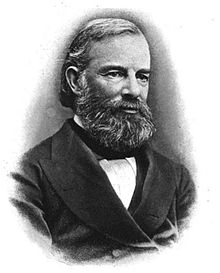Samuel Longfellow
Samuel Longfellow | |
|---|---|
 | |
| Born | June 18, 1819 |
| Died | October 3, 1892 (aged 73) Cape Elizabeth, Maine, United States |
| Resting place | Western Cemetery, Portland, Maine, United States |
| Nationality | American |
| Education | Bowdoin College, Harvard Divinity School |
| Occupation | Clergyman and hymn writer |
| Parent(s) |
|
| Relatives | Brother of Henry Wadsworth Longfellow |
| Signature | |
Samuel Longfellow (1819–1892) was an American clergyman and hymn writer.
Biography[]
Samuel Longfellow was born June 18, 1819, in Portland, Maine, the last of eight children of Stephen and Zilpah (Wadsworth) Longfellow.[1] His older brother was the poet Henry Wadsworth Longfellow. He studied at Bowdoin College in 1833.[2] He attended Harvard College and graduated in 1839 ranked eighth in a class of 61.[3] He went on to study at Harvard Divinity School, where his classmates included Thomas Wentworth Higginson and Samuel Johnson, with whom he would later collaborate in his hymn writing.
He is considered part of the second-generation of transcendentalists;[4] after becoming a Unitarian pastor, he adapted the transcendental philosophy he had encountered in divinity school into his hymns and sermons.
Longfellow served as a gym leader in Fall River, Massachusetts (1848), Brooklyn's Second Unitarian Church (1853), and Germantown, Pennsylvania (1878-1882). After his older brother's death, Longfellow published a two-volume biography of him in 1886.[5] He wrote the book while living at his brother's former home, Craigie House in Cambridge, Massachusetts.[6] In 1878, Longfellow was elected as a member to the American Philosophical Society.[7]
His other publications include Final Memories of H. W. Longfellow (1887), Vespers (1859), A Book of Hymns and Tunes (1860, revised 1876) and, with Samuel Johnson, he edited A Book of Hymns for Public and Private Devotion (1846) and Hymns of the Spirit (1864).[6] Longfellow died in 1892 and is buried in Western Cemetery in Portland's West End.
Selected bibliography[]
- A Book of Hymns for Public and Private Devotion, 1846, edited with Samuel Johnson. The collection was enlarged and revised in 1860.
- Thalatta: a Book for the Seaside, with Thomas W. Higginson, 1853
- Vespers, 1859
- The Poem of Niagata, 1861
- Hymns of the Spirit, 1864 (jointly edited with Samuel Johnson)
- The Life of Henry Wadsworth Longfellow, 1886
- Memoir and Letters, 1894
References[]
- ^ Abdo, Joseph C. The Quiet Radical: The Biography of Samuel Longfellow. Lisbon, Portugal: Tenth Island Editions, 2008: 24. ISBN 9789729985829
- ^ General Catalogue of Bowdoin College 1794-1950, page 76
- ^ Abdo, Joseph C. The Quiet Radical: The Biography of Samuel Longfellow. Lisbon, Portugal: Tenth Island Editions, 2008: 56. ISBN 9789729985829
- ^ Gura, Philip F. American Transcendentalism: A History. New York: Hill and Wang, 2007: 8. ISBN 0-8090-3477-8
- ^ Wayne, Tiffany. Encyclopedia of Transcendentalism. New York: Facts on File, 2006: 169. ISBN 978-0-8160-5626-2
- ^ Jump up to: a b McKim, LindaJo H. The Presbyterian Hymnal Companion. Louisville, Kentucky: Westminster/John Knox Press, 1993: 228. ISBN 0-664-25180-3
- ^ "APS Member History". search.amphilsoc.org. Retrieved May 12, 2021.
External links[]
| Wikiquote has quotations related to: Samuel Longfellow |
- Works by Samuel Longfellow at Project Gutenberg
- Works by or about Samuel Longfellow at Internet Archive
- http://www.hymntime.com/tch/bio/l/o/n/longfellow_s.htm
- https://web.archive.org/web/20080724033609/http://www.alcott.net/alcott/home/champions/Longfellow.html
- http://www.encyclopedia.com/doc/1E1-E-LongfellS.html
- American Unitarian clergy
- Harvard Divinity School alumni
- 1819 births
- 1892 deaths
- Christian hymnwriters
- 19th-century Christian clergy
- Writers from Portland, Maine
- People from Cape Elizabeth, Maine
- Burials at Western Cemetery (Portland, Maine)
- Harvard College alumni
- 19th-century American clergy